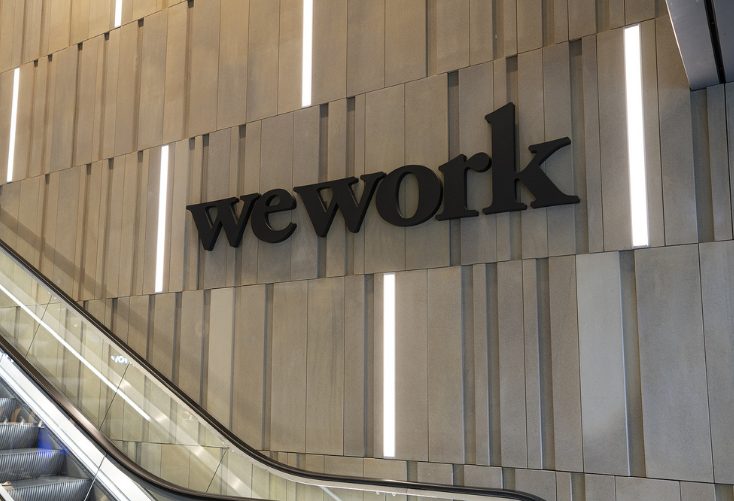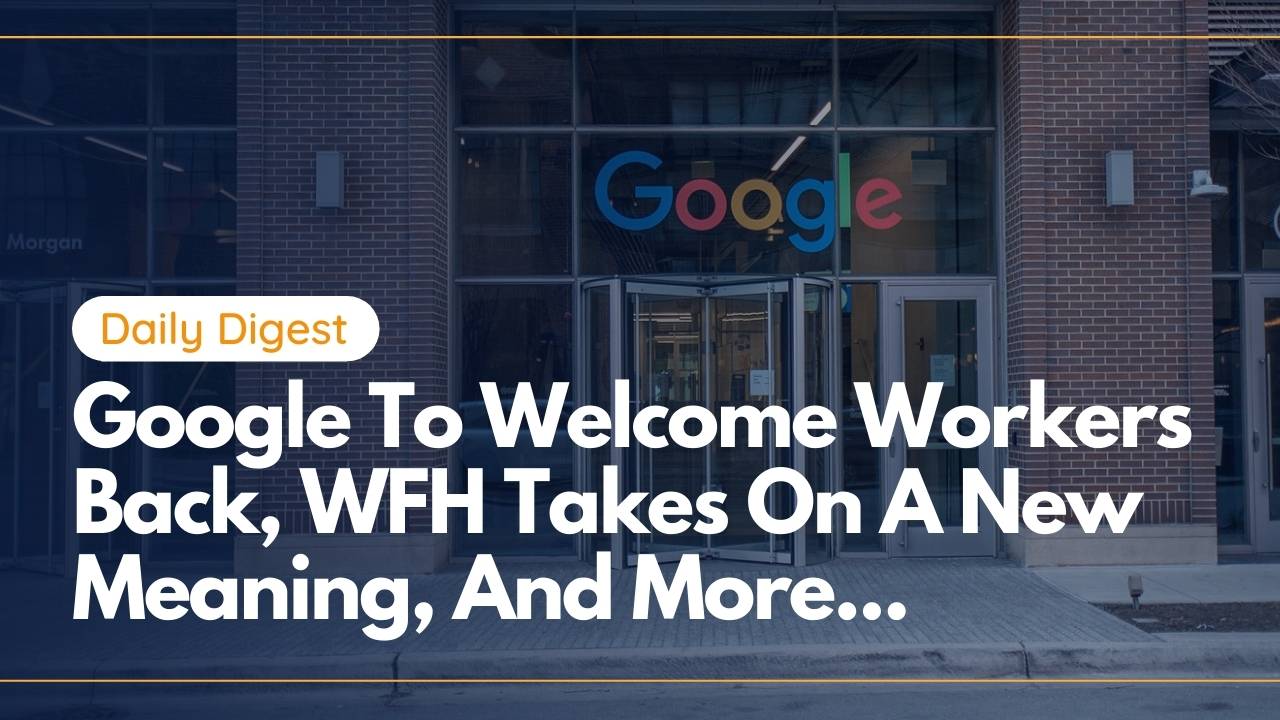Hand selected flexible workspace news from the most reliable sources to keep you ahead of the pack. We find all the latest news, so you don’t have to. Morning and afternoon updates. Stay in the know.
Here’s what you need to know today:
- WeWork Enlists JLL To Lease Location In The U.S.
- Will Britain’s Employers Require The Vaccine?
- Merging Automation And Soft Skills
- The Future Of Remote Working Policies
- The Ideal U.S. Cities For Digital Nomads
- Office Interest Grows, But Activity Remains Slow
WeWork Enlists JLL To Lease Location In The U.S.
WeWork has enlisted JLL to market and lease 38 of its coworking locations across seven cities across the country.
This partnership means JLL will act as “an extension of WeWork’s in-house sales team” across Atlanta, Boston, Dallas, Denver, New York City, Phoenix and San Francisco.
“We are excited to work alongside JLL during this time of rapid change in the office environment,” said Shyam Gidumal, president and chief operating officer of WeWork. “JLL’s deep industry knowledge, experience, and relationships will enable us to connect with the expanding range of small to large enterprise tenants who can benefit from WeWork’s portfolio of flexible space offerings.”
With the return to the office heavily dependent on employee sentiment, vaccine distribution and the potential for new variants, the company is hoping to offer more flexibility for businesses during this uncertain time.
A recent JLL survey of 2,000 office workers found that two-thirds of respondents want to work from various locations after the pandemic, and office owners are looking to expand their space in order to accommodate this demand.
JLL also anticipates that the flex space market will one again grow during the second half of the year. While the large amount of sublease space is alarming for the market’s recovery, JLL Vice Chairman Clark Finney believes that WeWork is in the perfect position to address this.
“Subleases very rarely allow pass-through renewal options, expansion rights or similar considerations,” said Finney. “WeWork can address all of these concerns, and that is a major differentiator and demand driver in the current market.”

Will Britain’s Employers Require The Vaccine?
New research from BrightHR finds that half of Britain’s workers are expecting their employers to require a vaccine passport before they return to the office.
However, the study of 5,000 British workers revealed that only 17% have had a conversation about vaccine policies with their employers. Because of this, one-fifth of respondents stated they fear for their health if employers do not make the vaccine mandatory for employees.
On the other hand, two-thirds of employees say it is too controlling for an employer to require the vaccine.
“Although half of people expect their employer to demand a vaccine passport, it remains to be seen how reasonable those demands are and, therefore, whether the employer is acting lawfully in doing so,” said Alan Price, CEO of BrightHR. “Employers must tread carefully when requiring employees to have the vaccine and ensure that their circumstances are appropriate.”
Those in the hospitality industry topped the list of workers that believed vaccines should be mandatory at 44%, compared to 24% of office workers and 21% of key workers.
Additionally, the 13% who stated they do not plan on taking a vaccine that is offered to them claimed that side effects are their biggest concern. Two-third also said they worry about having to take time off if they are impacted by vaccine side effects.

Merging Automation And Soft Skills
Analysis from McKinsey has found that 67% of organizations have ramped up their adoption of AI and automation over the past year or so.
While this has been a necessity during a time where millions of people are working from home, the importance of soft skills, such as communication and empathy, have never been more important than today.
So what role does automation serve in the evolution of soft skills with a distributed workforce?
According to research from UiPath, over 70% of executives and managers said they are most likely to hire a candidate with experience in automation and AI, even if the job description does not necessarily require those skills.
Automation has given workers the chance to free up their time in order to work on other things. However, it’s clear that this technology cannot fully replace the “human” aspect that all companies need.
This is why employees have to find new ways to use some of this free time by expanding their soft skills, such as coming up with creative solutions to problems, creating new content for newsletters, building new policies focused on improving the employee experience and more.
Additionally, automation has the opportunity to empower collaboration in a way that has never been replicated.
Although the lack of in-person teamwork has been evident in the past year, automation software makes it easy for colleagues to work on a single project within the same document. This technology can also be applied to communication with customers through auto replies, including informing them of any changes in policies they should be aware of, shipping expectations and more.

The Future Of Remote Working Policies
The world of remote working has drastically evolved over the past year, and the future of this work arrangement is expected to look even different in a post-pandemic world.
According to Limeade Institute’s Employee Care Report 3.0, 71% of respondents said they worried about less flexibility in the future.
It’s clear that many professionals have grown accustomed to remote working policies and are not prepared for a full return to the office once the pandemic subsides. In fact, a survey from FlexJobs found that 55% of respondents said their productivity grew when working remotely.
Additionally, the benefits of remote working, like cost savings, lack of commute and scheduling flexibility are perks that workers want to hold onto in the post-pandemic era.
“I’m not surprised to see that more than half of people working remotely during the pandemic, even under these strained and unusual circumstances, appreciate its benefits to such a strong degree that they would leave their current jobs in order to keep working from home,” said Sara Sutton, founder and CEO of FlexJobs. “The landscape of remote work has permanently changed as a result of Covid-19, and its impact will be felt in the job market and the workplace well into the foreseeable future.”
For many, flexible working in the future will likely come in the form of hybrid work arrangements that merge both remote and in-office work arrangements. Even large companies like Microsoft and IBM have announced their commitment to long-term hybrid work models in order to maintain the flexibility employees have come to love, while also offering a place of solace outside of workers’ homes.

The Ideal U.S. Cities For Digital Nomads
Now that vaccines are becoming more distributed in certain areas of the world, the idea of living and working where you want has finally come within reach.
That’s why Yelp and Zillow recently revealed their “digital nomad index” that ranks the top U.S. cities ideal for remote workers looking to adopt a digital nomadic lifestyle.
“It is clear that this past year has caused many to reconsider their housing needs and wants—and sometimes that means not wanting to be tied to one spot for too long,” said Nicole Bachaud, economic data analyst at Zillow.
Topping the list was Jacksonville, Florida, which features relatively low rental rates of under $1,000, as well as local restaurants and vacation getaways like Ponte Vedra Beach.
Second on the list was Austin, Texas, which sees a similar low average rental rate to Jacksonville, and is bursting at the seams with culture and coworking opportunities.
Third was Boise, Idaho, which features low costs of lying, as well as recreational-focused businesses for those wanting to explore the great outdoors.
Nashville, Tennessee, also known as the Music City, is known for its bustling live music scene, as well as local offerings such as Prince’s Hot Chicken (the birthplace of the spicy cuisine) and music venue Shack Robert’s Western.
Rounding out the top five was Charleston, South Carlina, which is known for its beach-centric environment with plenty of outdoor activities, as well as its southern cuisine.

Office Interest Grows, But Activity Remains Slow
According to a monthly report from software provider VTS, demand for office space across major U.S.markets grew by 28% from February to March.
VTS’ Office Demand Index, which is largely based on the amount of office tours by potential tenants, saw a 160% spike during the first quarter as returning to the office seems more and more likely in the coming months.
However, despite interest in office space climbing, this has yet to translate to actual leasing activity.
“[Q1 was] just a continuation of what we had experienced the past few quarters,” said Steig Seaward, National Director of Research at Colliers. “Tenants are slow to return to the office. Nothing has really changed.”
This is also true of in-person work. Analysis from Kastle Systems found that office usage across the 10 largest U.S. markets averaged at 26% at the end of April, which is only a few points above the rate in mid-January.
Read Mortimer, Regional Director at Rubenstein Partners Sun Belt, noted that along with the increase in tours of their offices, leasing is just now becoming active as companies who were seeking office space prior to the pandemic resume their search.
“Across our portfolio, whether it’s corporate tenants, law firms or investment banks, Labor Day seems like the outside date for returning,” said Mortimer. “A lot has coalesced around the push for returning.”




 Dr. Gleb Tsipursky – The Office Whisperer
Dr. Gleb Tsipursky – The Office Whisperer Nirit Cohen – WorkFutures
Nirit Cohen – WorkFutures Angela Howard – Culture Expert
Angela Howard – Culture Expert Drew Jones – Design & Innovation
Drew Jones – Design & Innovation Jonathan Price – CRE & Flex Expert
Jonathan Price – CRE & Flex Expert










